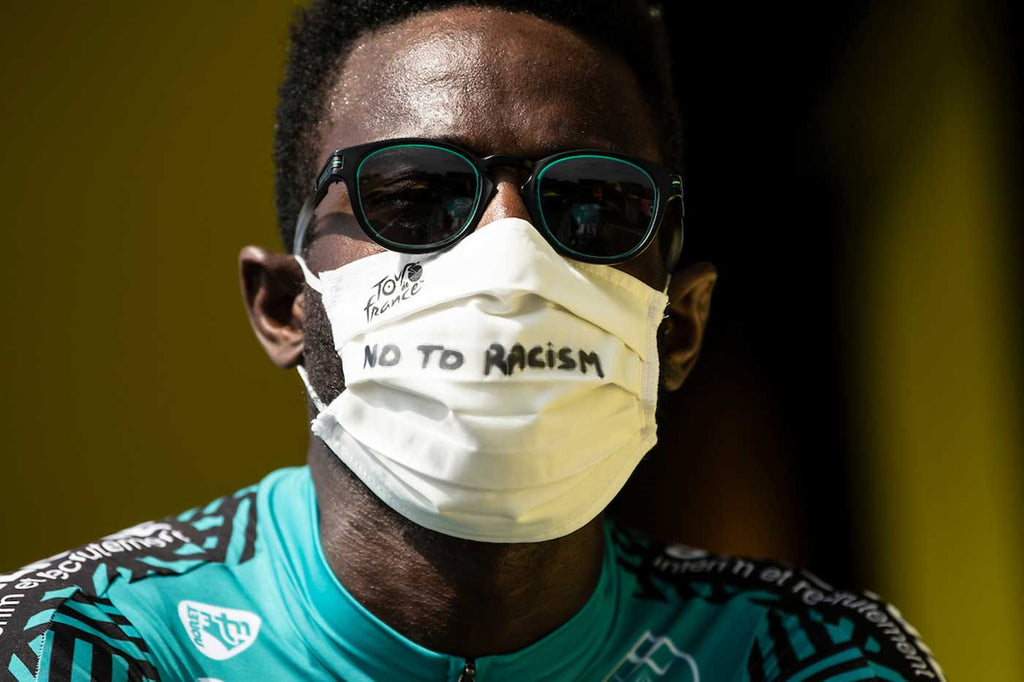Somewhere in ad land, young creatives dream of an advert that truly captures the zeitgeist. A short promotional clip becomes a social media phenomenon – reposted left, right and centre as everyone siphons off their own share of that original burst of approval. There’s no denying that Danish TV channel TV2’s advert for its Tour de France coverage achieved exactly that. Yet there was something so obviously amiss.
Sure it was great fun – a pastiche of the try-hard cycling community in which many could see a mirror on themselves. Only, it felt as though that mirror wasn’t meant for me. To me, it just gently unpicked the perception of change in the sport of cycling that had given so many of us hope over the last year.
Related – Tour de France 2021 Preview
⠀
— ⓑιcιcletⓞ (@Bicicleto_ZGZ) June 15, 2021
It's coming... 🇫🇷
⠀ pic.twitter.com/Bi4Q6HNSgK
In case it slipped your notice, every single actor in the advert was white. Everyone on a road bike was a white male. In fact, the only woman cycling happens to be on a cargo bike with kids in the front – draw your own conclusions there.
Before we dwell on that, though, let’s backtrack one year.
The death of George Floyd sparked such anger and outrage that finally the Black Lives Matter movement was being heard around the world. On football pitches, basketball courts, rugby pitches and in sporting venues across the globe athletes were standing in solidarity and taking a knee. That represented a mark of respect and brought attention to the divide in equality in everyday life.
Related – Baltimore Son: A black cyclist in America
Almost every sport adopted this stance, one sport which notably stood silent on the matter was cycling. There was some scribbling on facemasks at the 2020 Tour de France as photographers were pushed in front of Kevin Reza, the only black rider at the Tour that year, to show that cycling is doing something to address its huge diversity issue. In truth, it was the riders who, at the end of a three-week race, had to organise the facemask debacle, not race organisers or the UCI.
Cycling publications across the land scrambled to get Black Cycling Network in their column inches as everyone started to realise how white the sport is – white, and male, of course.
Skip forward to a year on and what has changed? In my opinion, nothing. There has been much talking but not a lot of walking.
This isn’t some politically correct rant, or even some “woke” agenda (as if being aware of what is going on around you should attract criticism), but it’s a reminder that if you do not see someone like you in cycling, the chances of you taking up cycling are very slim.
My heritage is Indian, my mother was the first in her family to be born in England, her two brothers and mother came over to England from India on a boat which took twelve weeks. My mother’s dad came over two years after that, working and creating a life for the family. For my mum to bring a white man into the family was unheard of, her father refused to talk to her for weeks. Culture clashes can be a shock, but with time, patience and understanding everything came together and now many, many years later, here I am still trying to find some level of equality.

Kevin Reza at the 2020 Tour de France, Photo: Alex Broadway/ASO
I don’t know any famous Indian cyclists, but in 2008 there was a certain B. Wiggins who took over my life. The way he rode a bike, looked and spoke – I wanted to be just like him. He was the epitome of cool. Then in 2012 there was nothing better than watching him ride to yellow in the Tour. I ride a bike because of Bradley Wiggins and I’ll always be grateful to him for that.
So let’s go back to the advert. You could argue that you can find inspiration to ride from anywhere, just as I have with Bradley Wiggins. So what does it matter that there is no one of colour in the advert? It’s not even for British TV, it’s for a Danish TV channel – a country with a demographic that is predominantly white people of Danish descent. Yet, it does matter.
It matters because it represents cycling – the embrace it received from thousands of social media users and brands reflects that people saw this vision of cycling and saw nothing unusual, nothing missing. It was spot on – 100%, 10/10.
Those same people posted black squares to their profile, and shared Black Lives Matter stories. Was BLM just another trend, another set of posts to share, superseded by a funny advert for the Tour?
The advert shows that the Tour de France isn’t for me. But not only that, it glances over black people, women, disabled people or anyone other than white men who may enjoy watching the race.
As a person of colour, I’m yet again let down by the world of cycling. How is anyone like me, who may be interested in cycling, cycling journalism or broadcasting going to be inspired by an affirmation of the stereotype of the male cycling fan.
If cycling is to take diversity and inclusivity seriously, a depiction of cycling like this shouldn’t be the one we celebrate.
Cover image credit: TV2
































